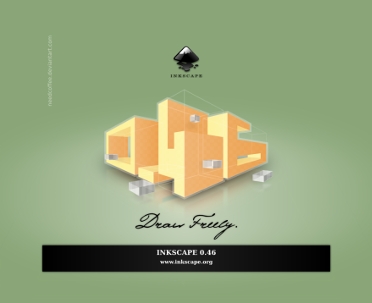Since there are few topics about academic etiquette than get me as excited as the norms of citations, I was quite fascinated by Joseph Reagle’s
blog entry on the topic, a discussion that spanned a summary of
Helen Nissenbaums’ work on the subject to his own wrangling with how he should recognize others who have independently reached similar conclusions as his own.
Citations fascinate me because they are one of the few tangible inscriptions that reveal just how much of our work is indebted to others; it is stimergic (and if you don’t know what that is, read Joe’s entry as his moral wrangling over citations had to do with this term, his use of it and the discovery that someone else came up with it also). Despite the fact that all disciplines use them, we use them slightly distinctly. Lawyers use them in lawyerly-like ways: they cite the crap out of everything (it is kinda annoying but kinda helpful) and this makes total sense: they are covering their asses (lawyers know how to do this well), they are following the logic of their own practice as case law is quite citational, and well, law professors usually have one if not two research assistants, and this I am sure helps them in covering their citational bases.
Another big difference in practices of citations is between a conventions that includes the name of the person you are citing in the body of the text and those that stuff all that data in a footnote. I can’t stand the later convention, not only because it is a pain in the neck to have to go back to the footnote JUST to see who the heck the author is citing but I think the credit should be right there, springing off the page so that the politics of collaborative recognition are, well, very evident (and I do understand that if you are citing a buttload of folks, that sometimes it is just better to do that in footnotes and sometimes with history they are citing way to may folks to really do it effectively in the body of the text).
Joe raises some fundamentally thorny questions of who and how do we cite given that we may come up with an idea with the power of our own little brains, only to find out (gasp) that others, past and present and very unknown others, say something similar. On the whole, I tend to try to make clear, as Joe did in the example he provided, where I am totally taking the idea from someone to apply to another idea of mine and where I have an independently crafted idea and I am citing others so as to support my own position, which usually only strengthens my own argument. And what I find is that just because a cohort of folks may be working on similar topic (open souce, hackers), since we do so from our own perspectives and methods, most of the research will be original, though not as much as we tend to perform to our superiors. Also I sometimes find myself with an idea, which I consider as my own, but where I am so in need of a citation because it is an idea that seems at an intuitive level to be right on but it is hard to truly substantiate with the data I have (I am in that position right now and am desperate to find someone who says what I say and thus have a means to support what otherwise seems like a lofty idea…)
And in fact, one thing that bothers me about citations is that we don’t seem to take seriously that the date of publication may not just tell us when something was published but help us gauge if something can become “dated.” What I mean is that when (and I guess if) I publish my book on hackers and Debian, it will not be a reflection not of some timeless aspects of hacking but firmly based out of the time period (roughly 10 years give or take 3 or 4) that I was either researching and writing about the topic. And while you can and should cite folks who wrote stuff in the past because that stuff still matters (a lot of what Steven Levy says for example still holds water) a lot changes. And yet I can’t stand how folks then cite someone as wrong when in fact all that went wrong is that time does what it does best: MOVE FORWARD and social phenomenon change along with the passing of new moons. This is not as likely to happen in the hard sciences but sure as heck happens with anything in the so-called human realm (which is why it bothers me that the social sciences and humanities model our citational and journal practices so similarly to the hard sciences, when it seems there are enough differences to warrant more differences than there are but that is a whole other topic). So now I try to note where my analysis diverges because the context so radically changed and really leave critique for those things I can safely and fairly disagree with on its own terms.
Finally, Nissenbaum’s article seems so interesting (I have not yet read it but now will) because it confronts how our practices of citations may or may not (or should) change in the face of a proliferation of access to work due to electronic media (she flags: wildcat publisher, grey literature, preprints). But I have found that, at least in anthropology journals, and especially in the anthropology of science, technology, and medicine, authors are mostly citing other anthropologists, as if a whole scholarship on a topic was non-existent, which seems more odd today when it has gotten easier to mine and find this stuff. They only cite “non-anthro others” when these folks are so standard, it would look horrible not to do so, but there is not a move to branch out, which I find a real shame and why I sometimes get really down on disciplinary journals (and why I am quite content to be joining an interdisciplinary department).
And to be clear, I don’t fault individual authors, it seems that this is the unstated expectation and if that is what is going to get you in a journal, and that is what gets you tenure brownine-points, then you do as everyone else does.
And that brings me to the final point which is the problem with standards in citational practices. So for example in the field of science studies, everyone must and usually does cite Bruno Latour. And as Chris Kelty
reminded us, there is *very* good reason to. But I find what happens is that once a person is flagged and gets cited
ad nauseum (which is mostly a decent but not full proof baramoter for judging good work), it become self-perpetuating reality/cycle because everyone else is doing it and it seems weird if you don’t (and I have sometimes seen some articles just awkwardly cite famous people in their discipline when it made little sense to do because, I think of this phenomenon). So all of a sudden, it becomes all Microsoft-Windows like: you cite, they cite, and it becomes “standard” who you cite and you can’t seem to escape the default.
But alas, there is always an escape hatch, because one of the gems in academia is discovering that one theorist or book relate x to y and z topic that for some reason everyone else overlooked (because they were busy citing Latour,) to bathe some topic in a wholly new light and then a whole group of folks become unfashionable and the cycle begins, yet again….
The solution? If we only had a couple of research assistants like the lawyers, well maybe we could branch out a little and cover our bases a little..

 As a standalone browser, it may look quite similar to vimperator (default key-bindings and interface are strongly vim-like), but overall it offers a more powerful and completely reconfigurable user-interface, can be fully scripted and hooked with self-made helpers and is even embeddable in other applications (eg. Emacs). Nonetheless, it brings all the power of a fully fledged webkit renderer.
You may find it particularly useful when working within a tiling window manager (like awesome or xmonad), or used as a full-screen remote monitor, easily controllable via socket (you should really try socat with it!) or plain-text fifo (for a bunch of stats, as easy as a
As a standalone browser, it may look quite similar to vimperator (default key-bindings and interface are strongly vim-like), but overall it offers a more powerful and completely reconfigurable user-interface, can be fully scripted and hooked with self-made helpers and is even embeddable in other applications (eg. Emacs). Nonetheless, it brings all the power of a fully fledged webkit renderer.
You may find it particularly useful when working within a tiling window manager (like awesome or xmonad), or used as a full-screen remote monitor, easily controllable via socket (you should really try socat with it!) or plain-text fifo (for a bunch of stats, as easy as a 




 It's more or less four months since I proposed to
It's more or less four months since I proposed to




